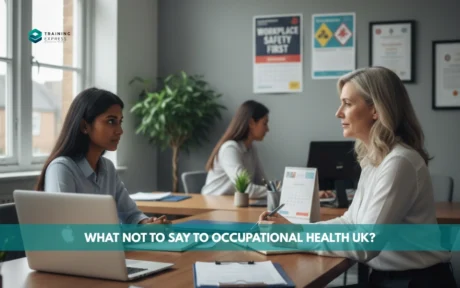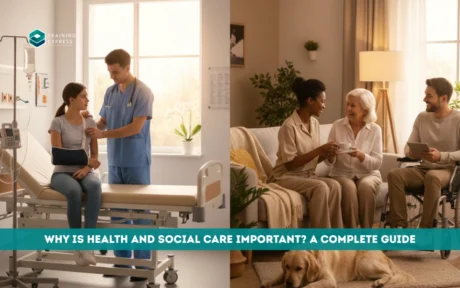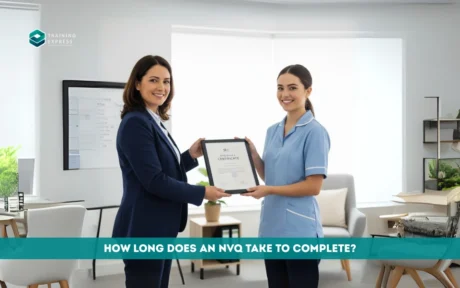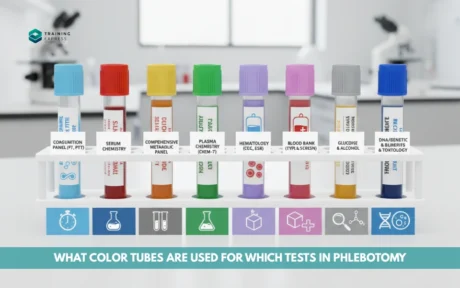
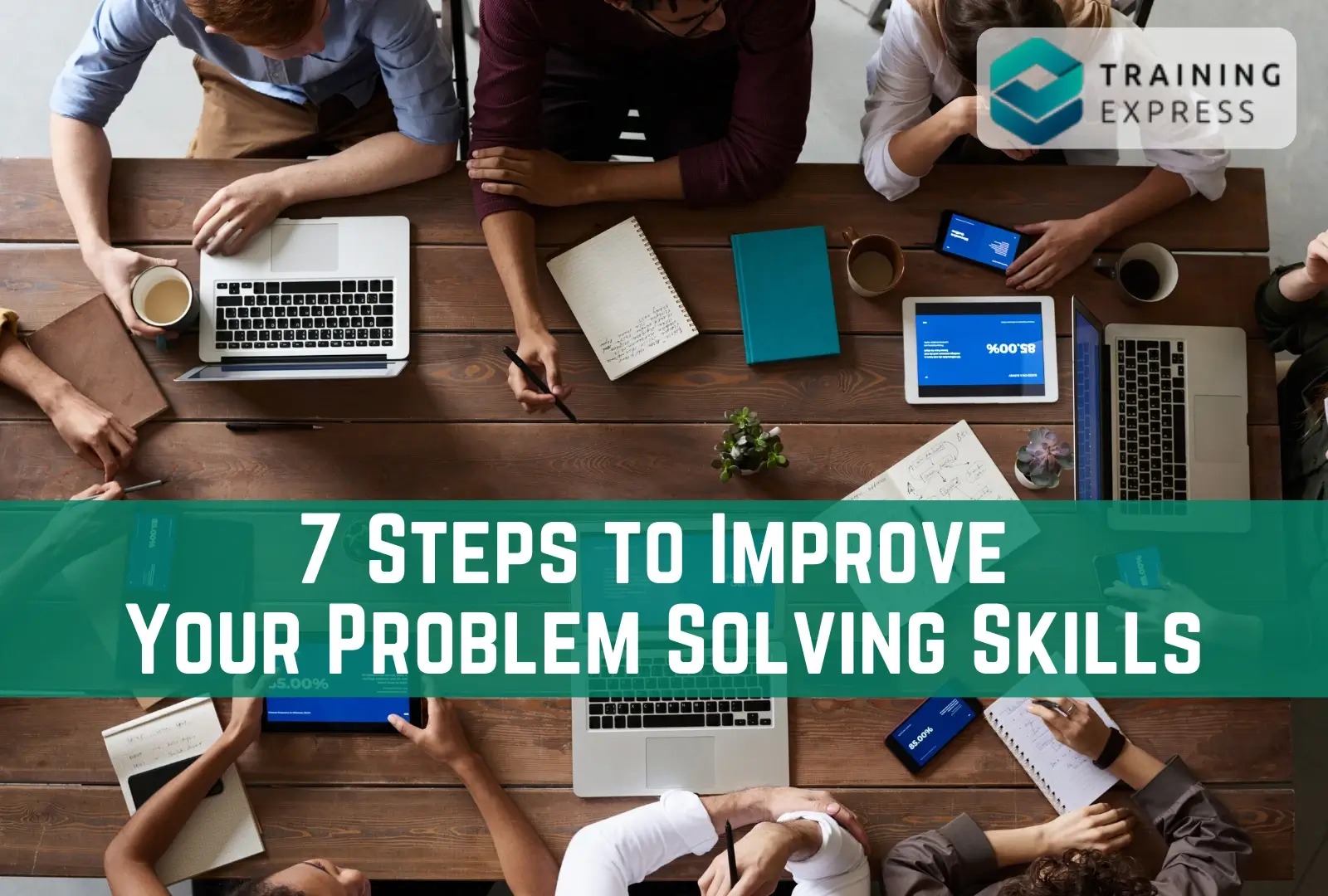
Problem solving skills are the ability to identify an issue, analyse it, and develop an effective solution efficiently. These skills are crucial in both personal and professional settings, helping you tackle everyday challenges with confidence and clarity.
In the workplace, strong problem-solving isn’t just about finding answers—it’s about how fast and effectively you do it. Whether you’re managing a team or handling daily operations, your ability to solve problems directly impacts performance, decision-making, and career growth. This guide breaks down seven practical steps to sharpen your problem solving techniques so you can act faster, think smarter, and lead better.
Table of Contents
What is Problem-Solving?
Problem-solving is both a skill and a method. As a skill, it helps individuals tackle challenges in various areas of life, including at home, school, work, or in social settings. As a method, problem-solving follows a structured approach to identify, analyze, and resolve questions or obstacles that occur in everyday life.
7 Key Steps to Improve Your Problem Solving Skills
However, everyone is by born a problem solver. But the thing that counts is how efficiently the problem is being solved. That’s why you should nurture problem-solving skills to become an ultimate problem solver. In this article, you’re going to explore seven effective steps that will help you improve your problem solving techniques. So, without further ado, let’s dig deeper.
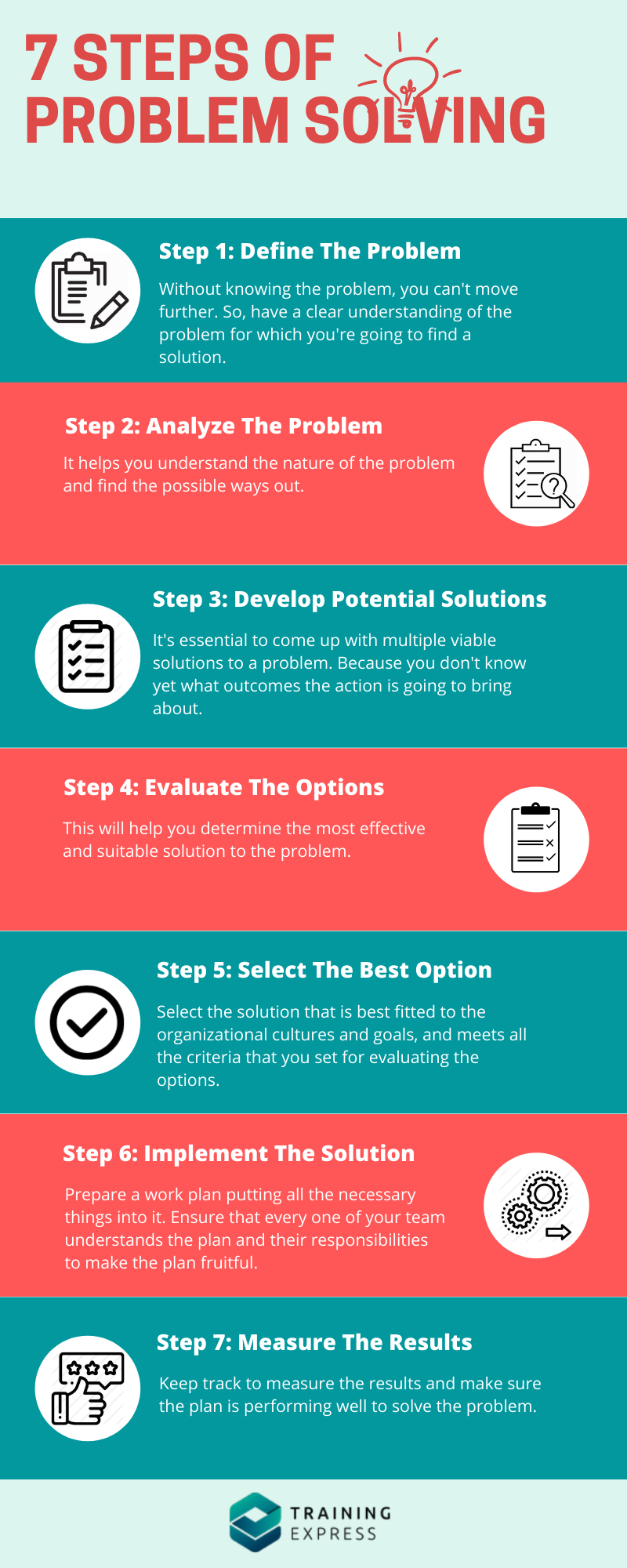
Step 1: Define The Problem

The first thing that comes when solving a problem is identifying and defining the problem. Without knowing the problem, you can’t move further. So, have a clear understanding of the problem for which you’re going to find a solution. Define the problem and make it precise. Since you won’t be working alone, describe the context, and make sure it is understandable by others who are involved in the decision-making process. However, different people have different perspectives on what a problem is, and you should keep it in your mind.
If the problem involves software development or coding challenges, don’t hesitate to get coding help to ensure you’re on the right track and can communicate solutions effectively.
Step 2: Analyse The Problem
The second step to solving a problem is analysing the problem. It helps you understand the nature of the problem and find the possible ways out. Develop some creative problem-solving questions in this stage, such as why it is a problem, why it is required to solve it, how to find the solution, what barriers and opportunities lie within the problem, what effect it will cause if the problem isn’t resolved, etc.
Develop these questions and assign answers to them. In the end, you’ll find a clear picture of the whole situation. This will help you prepare your strategy to solve the problem.
Step 3: Develop Potential Solutions
Once you’re done with analysing the problem, you have to look for potential solutions to the problem. Note that I said solutions, not a solution. It’s essential to come up with multiple viable solutions to a problem. Because you don’t know yet what outcomes the action is going to bring about. That’s why you should have alternatives in all possible ways to solve the problem so that you can compare them and pick the best one.
In this regard, you have to set a standard with which you will compare the expected outcomes of the potential solutions. However, don’t use the standard to judge the solutions, instead, use it only for coming up with ideas.
Step 4: Evaluate The Options
After listing down the potential solutions to the problem, your next task is to analyse and evaluate the options. This will help you determine the most effective and suitable solution to the problem. Now it comes how to evaluate the options. Do it almost in the same way you’ve analysed the problem before. This means asking some questions and comparing the answers for different options. So, the creative problem-solving questions that you’ll make to evaluate the problem may look like the followings:
- Is the solution easily achievable?
- How much effort and resources it will take?
- Does it fit the organizational processes and cultures?
- What are the pros and cons of the solution?
- What is the possible outcome of this solution?
- Is it well suited to the time and budget?
Prepare the answers for each of the options and compare them. Then eliminate those which don’t pass the criteria and tailor the list for further action.
Step 5: Select The Best Option

After evaluating all the possible solutions and tailoring the list, you have a concise list of solutions to the problem. Now you have to choose the best solution among these options. Select the solution that is best fitted to the organizational cultures and goals, and meets all the criteria that you set for evaluating the options. In this case, your experience, courage, and decision-making skills will help you to determine the option.
However, you may consult your peers as it would give you different insights into the situation. After selecting the best-suited solution, make the necessary documentation, and submit to the authority for approval.
Step 6: Implement The Solution
You’ve selected the solution to the problem and got it approved by the higher authority. Now it’s time to go for action and showcase your problem-solving skills. So, at first, you have to prepare a detailed work plan putting all the necessary things into it. You have to ensure that every one of your team understands the plan and what are their responsibilities to make the plan fruitful. So, you should communicate well with everyone involved in the plan.
Also, your plan should include actions to be taken if something goes wrong or doesn’t go just like as you thought it would. This is important to make a concrete plan. After setting the plan, arrange everything you require and put your solution into action, and wait for the results.
Step 7: Measure The Results
Your duty isn’t finished with the implementation of your solution. You have to keep track to measure the results and make sure the plan is performing well to solve the problem. Great leaders always keep follow-ups and proper documentation of their actions. It’s helpful in their future challenges and acts as a guideline for their successors. Moreover, it will help you show a scalable and notable outcome of your plan to the authority.
Now it’s time to wrap up. Following these seven simple steps will strengthen your problem-solving skills and make you an efficient problem solver in your organization. However, problem-solving is a vast topic, and there are even more things to explore about it which aren’t possible to include in a single article. If you want to explore more and develop your problem solving techniques, it will be better to take training on this.
But how can you attend formal training when you’ve lots of duties to do? In this case, you can consider taking online training where you can learn anytime from anywhere, and most importantly, without juggling your regular schedule. To help you in this regard, Training Express is offering an online course on problem-solving skills where you’ll be learning from experts. So what are you waiting for? Have a look at this.
Why Problem-Solving Skills Matter in Real Workplaces
Problem-solving isn’t just theory—it’s what keeps workplaces running. Imagine a care home manager facing a last-minute staff shortage. Instead of panicking, they quickly assess available staff, reassign shifts, and ensure residents still receive proper care.
Using a simple problem-solving model—Identify, Analyse, Act—they turn a crisis into a controlled response.
Here’s why this matters:
- Boosts team confidence during emergencies
- Keeps service quality consistent under pressure
- Shows leadership and reliability
In fast-moving sectors like health and social care, problem-solving is a daily, essential skill that sets
How to Get Better at Problem-Solving
Improving your problem-solving skills doesn’t happen overnight. It takes practice, focus, and the right mindset. The more you approach problems with structure and curiosity, the more effective you become. Strong problem-solving not only helps in the workplace but also boosts confidence in daily life. Whether you’re managing a team or making personal decisions, learning how to solve problems better gives you a powerful edge.
Break Problems into Smaller Parts
Large problems feel overwhelming. The solution? Break them down.
- Identify the core issue
- List smaller contributing factors
- Tackle one step at a time
- Use checklists or diagrams to track progress
This method reduces stress and helps you think clearly.
Practice with Real-Life Scenarios
Use real examples to sharpen your skills.
- Reflect on past challenges and solutions
- Role-play workplace situations
- Ask “What would I do differently next time?”
- Study how experts handle similar issues
The more you apply problem-solving to real contexts, the sharper your thinking becomes.
Common Mistakes in Problem Solving
Many people struggle with problem solving because they fall into common traps. Avoiding these mistakes can significantly improve your decision-making process:
- Jumping to Conclusions: Acting too quickly without understanding the full issue often leads to poor results.
- Poor Problem Framing: If the problem isn’t clearly defined, your solution will likely miss the mark.
- Over-Reliance on Intuition: While gut feeling can help, it should be balanced with facts and logic.
- Ignoring Alternatives: Failing to explore other options limits creativity and effectiveness.
- Weak Implementation: Even great solutions can fail if not carried out properly.
- Not Learning from the Outcome: Skipping reflection means repeating the same mistakes in the future.
Recognising and avoiding these pitfalls can make your problem solving techniques sharper and more reliable.
How Our Course Can Help
Take your leadership and problem-solving skills to the next level with our Level 3 Problem-Solving & Leadership Course. This training is built for busy professionals who want results without long hours of study.
Complete it in just 1 hour and 29 minutes, at your own pace, from anywhere. The content is direct, practical, and focused on skills you can use immediately.
What you’ll get:
- CPD-accredited certificate included
- Fully online and self-paced learning
- Short course with clear, structured lessons
- Over 1 million students trust our training
Start today and improve how you think, lead, and make decisions—fast and effectively.
Final Words
Improving your problem-solving skills is not just about finding quick fixes—it’s about developing a mindset that helps you tackle challenges with confidence and clarity. By following these seven steps, from identifying the problem to evaluating solutions, you create a solid foundation for making smarter decisions. Whether in your career or personal life, these skills will help you stay calm under pressure, think critically, and act strategically. Start applying them today, and you’ll notice better results in how you approach any issue. Remember, effective problem-solving is a skill anyone can build—with practice, patience, and a structured approach.
Frequently Asked Questions
How to enhance problem-solving skills?
To boost problem-solving skills, practice critical thinking by breaking complex issues into smaller parts. Engage in brain teasers, puzzles, or strategy games like chess to sharpen analytical skills. Learn from diverse fields to broaden perspectives, fostering creative solutions. Collaborate with others to gain new viewpoints and refine ideas. Reflect on past decisions to identify improvement areas. Stay curious, ask questions, and embrace challenges as learning opportunities. Consistent practice, patience, and a growth mindset are key. Unlike generic tips, this approach combines practical exercises with reflective learning, ensuring adaptable, real-world problem-solving proficiency.
How to develop problem solving skills?
To develop strong problem-solving skills, start by practicing critical thinking daily—break problems into smaller parts and analyze them logically. Engage in puzzles, brain teasers, or strategy games like chess to sharpen your mind. Learn from diverse fields to broaden your perspective, and collaborate with others to gain new insights. Reflect on past challenges to identify effective strategies. Stay curious, ask questions, and embrace trial-and-error to build resilience. Consistently apply structured approaches like defining the problem, brainstorming solutions, and evaluating outcomes. Practice mindfulness to stay calm under pressure. Over time, these habits will enhance your ability to tackle complex issues confidently.
How to solve your problem?
Tackling any problem begins with a clear, systematic approach. First, define the problem precisely – what exactly is the issue? Next, break it down into smaller, manageable pieces. This makes it less overwhelming. Then, brainstorm potential solutions without judgment; aim for quantity. Evaluate each solution’s pros and cons, considering feasibility and impact. Finally, implement your chosen solution and evaluate its effectiveness. If it doesn’t quite work, don’t get discouraged! Re-evaluate, adjust your approach, and try again. Persistence and a willingness to iterate are key to successful problem-solving.
What is problem-solving as a skill?
Problem-solving is the ability to identify, analyze, and resolve challenges effectively using critical thinking, creativity, and decision-making. It involves breaking down complex issues, evaluating options, and implementing solutions. This skill is crucial in professional and personal settings, enhancing adaptability and resilience. Strong problem-solvers actively listen, collaborate, and learn from outcomes to improve future decisions. Unlike competitors who may oversimplify, this skill combines logical analysis with innovative thinking, making it essential for career success and navigating life’s challenges. Mastering problem-solving boosts confidence and efficiency, setting you apart in dynamic
What is the role of problem-solving?
Problem-solving is the process of identifying challenges, analyzing root causes, and implementing effective solutions to achieve desired outcomes. It plays a critical role in personal and professional growth, fostering critical thinking, creativity, and resilience. In workplaces, problem-solving drives innovation, improves efficiency, and resolves conflicts, ensuring teams adapt to changing circumstances. For individuals, it enhances decision-making and builds confidence in tackling complex issues. By breaking problems into manageable parts, evaluating options, and learning from outcomes, problem-solving empowers people to navigate life’s challenges successfully. Developing this skill through practice and reflection is essential for success in any dynamic environment.
How is problem-solving useful?
Problem-solving is incredibly useful because it’s a fundamental life skill that empowers you to navigate challenges effectively. It goes beyond just finding solutions; it sharpens your critical thinking, creativity, and decision-making abilities. From tackling daily dilemmas to complex professional hurdles, strong problem-solving skills allow you to analyze situations, identify root causes, develop innovative solutions, and implement them successfully. This leads to increased efficiency, reduced stress, and greater confidence in all aspects of your life.
How to Improve Critical Thinking?
Improving critical thinking involves actively engaging with information and refining your thought processes. Start by questioning everything – don’t just accept facts at face value. Dig deeper, ask “why” and “how,” and explore different perspectives.
Next, practice active listening and engage in thoughtful discussions. Truly understanding others’ viewpoints, even if they differ from yours, helps challenge your own assumptions and biases. Always seek out diverse information sources and critically evaluate their credibility. Finally, reflect regularly on your decisions and thought patterns. This self-awareness helps identify areas for improvement, allowing you to continually sharpen your critical thinking skills for better decision-making in all aspects of life.
Why do I struggle with problem-solving?
Many people find problem-solving challenging, and it’s rarely due to a lack of intelligence. Often, it stems from a combination of factors. You might be feeling overwhelmed by the problem’s complexity, leading to paralysis. Sometimes, the issue isn’t clearly defined, making it hard to find a starting point.
Fear of failure can also play a huge role, making you hesitant to try new approaches or take risks. Additionally, lack of necessary knowledge or experience in a specific area can hinder your ability to formulate solutions. Overcoming these involves breaking down problems, embracing a growth mindset, and actively seeking diverse perspectives.
How to train the brain for problem-solving?
To supercharge your problem-solving abilities, consistently engage in activities that challenge your mind. Think of it like a mental workout! Regularly tackle logic puzzles, Sudoku, crosswords, or strategy games like chess. Learning new skills, whether it’s a language, musical instrument, or even a new recipe, forces your brain to create new connections. Practice mindfulness to improve focus and clarity under pressure. Break down complex problems into smaller, manageable steps, and consider different perspectives. Don’t forget the basics: quality sleep, a healthy diet, and physical exercise are crucial for optimal brain function, directly impacting your problem-solving prowess.
- Available Courses
- Animal care10
- Design28
- Training6
- Accounting & Finance Primary49
- Teaching & Academics Primary37
- Teaching23
- Quality Licence Scheme Endorsed171
- Law10
- IT & Software228
- Job Ready Programme52
- Charity & Non-Profit Courses28
- HR & Leadership4
- Administration & Office Skills3
- Mandatory Training36
- Regulated Courses4
- AI & Data Literacy23
- Health and Social Care289
- Personal Development1617
- Food Hygiene116
- Safeguarding79
- Employability287
- First Aid73
- Business Skills293
- Management425
- Child Psychology40
- Health and Safety524
- Hospitality28
- Electronics31
- Construction62
- Career Bundles201
- Marketing39
- Healthcare170

 Food Hygiene
Food Hygiene Health & Safety
Health & Safety Safeguarding
Safeguarding First Aid
First Aid Business Skills
Business Skills Personal Development
Personal Development


